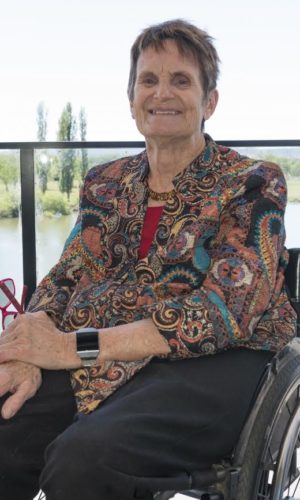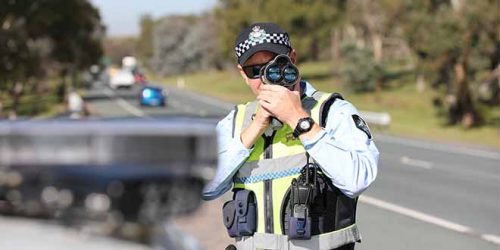AFTER a horse riding accident in 1995, this year’s ACT Senior Australian, Sue Salthouse, quickly became aware of the inequality between disabled and non-disabled people, and the issues of domestic violence against women with disabilites.

“People don’t think about disability until they’re facing disability,” says Sue, of Kingston, who wants to use her role as the ACT’s top senior to highlight the issues of domestic violence against women with disbilities.
Sue became a paraplegic in a “split second”, and at the time of the accident, the then 45-year-old was the acting principal at an ACT primary school, but decided that she didn’t want to keep teaching in a wheelchair.
“I decided to work in the disability sector and was given a job with Women with Disability Australia,” she says.
“I started working in the area looking at the incidents of violence against women with disabilities [where] there’s a high level of abuse and neglect.
“You quickly realise there’s a power imbalance between people with disabilities and non-disabled people, and sometimes that’s exploited.
“Sometimes that’s through abuse of a sexual nature and sometimes that’s a physical nature.
“We know with domestic violence, it’s gender-based violence in a significant proportion of Australian society and with disability, it’s much higher.”
Quoting the catchphrase, “there’s no excuse for abuse”, Sue says it’s everybody’s responsibility to value everyone and it’s everybody’s responsibility to manage their own behaviour and treat each other with respect and value every life.
“Anybody who relies on another person for assistance is at risk of abuse,” she says.
“We need to learn the skills to intervene and not be a bystander. It’s hard to intervene and say when you hear an incident of violence happening but it’s important to be able to have the skills to intervene.
“We really need to be able to say that we don’t tolerate that in our society.”
Sue, who works on the board of Women with Disability ACT and on the NDIS’s independent advisory council, is currently working for Lifeline to move its program “DV Alert”, a program teaching people the characteristics of domestic violence and how to recognise it, respond to it and report it, safely, online.
And while domestic violence against women with disabiltiies is a big driver for Sue’s activism, she’s also passionate to shine a light on the unnecessary barriers around participation for people with disability.
“While you’re in hospital and doing rehab, your body dynamics change completely so you have to relearn how to sit straight, how to push a wheelchair, how to do everything,” she says.
“You’re really cushioned from the outside world when you’re in hospital.
“It didn’t take long to find out that other people living with disabilities, whether they’re born with disability, had an accident, or a degenerative condition, their access to things in society is very limited.
“It’s much harder to get into the workforce because people assume what you can’t do rather than focusing on what you can do.”
And, without work, there’s no economic security, which Sue says means people are then more vulnerable to things that could go wrong.
But, she says employees should be more open to hiring people with disabilities because of the benefits they bring to the workplace.
“People with disabilities are amazing problem solvers because we’re always working out how we will get into this car, how we will use public transport, and apply these problem-solving skills to our work,” she says.
One of the hardest things for Sue has been physical access to places such as her friends’ houses.
“We need to be sure that we’re only building houses that are accessible for people with disability,” she says.
“Every home needs reinforced walls in a bathroom so later on you can put grab rails in.
“A lot of my friends I can’t visit because of steps.”
Sue thinks there should be a simple change to the building code to make it a little more accessible.
“I want everywhere to be visitable. I want to be able to live my life by visiting friends and having a social life,” Sue says.
Other odd attitudes she’s noticed are around stereotyping, and says it’s not uncommon for people to ask the person she’s with what she’d like to drink, instead of asking her directly.
“I really don’t know why it happens,” she says.
“I think that’s funny that people would assume they don’t talk to the person in the wheelchair or the person who looks different. Everybody has the capacity to choose what coffee they want.”
If you have experienced sexual assault, domestic or family violence, call 1800 RESPECT
Who can be trusted?
In a world of spin and confusion, there’s never been a more important time to support independent journalism in Canberra.
If you trust our work online and want to enforce the power of independent voices, I invite you to make a small contribution.
Every dollar of support is invested back into our journalism to help keep citynews.com.au strong and free.
Thank you,
Ian Meikle, editor





Leave a Reply